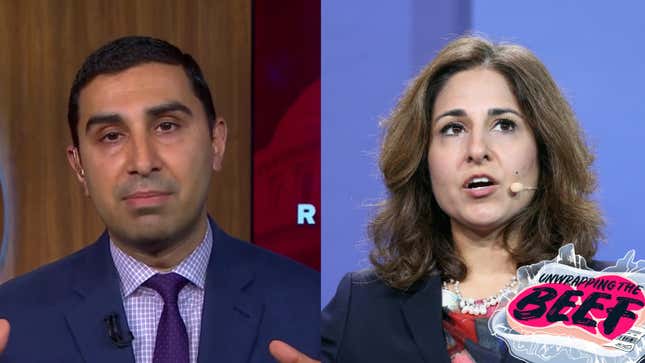

Bernie Sanders’s presidential campaign and the Center for American Progress are beefing again, rehashing—in record time—one of the central tensions of the last presidential campaign. At the meaty heart of the beef: the role of powerful gate-keeping Democrats in undermining Sanders’s insurgent 2016 campaign.
That dynamic is already beginning to repeat itself, with top Democratic operatives like David Brock expressing worry about Sanders’s run and planning an anti-Sanders campaign. Sanders, rather than ignoring all of this mess, however, is throwing down some gauntlets. The whole ordeal began this past Saturday when Sanders published a letter to the Center for American Progress and its sister group the Center for American Progress Action Fund, accusing the prominent centrist Democratic think tank of playing a “destructive role” in the “critical mission to defeat Donald Trump,” pointing to a series of articles that its publication ThinkProgress had published about him as well as articles it published about Elizabeth Warren and Cory Booker. One of the articles Sanders highlighted, published on April 10, noted that Sanders is now a millionaire; the other was a video that pointed out how Sanders had stopped calling out millionaires as he became wealthier, instead choosing to direct his ire at billionaires only. In his letter, he specifically called out CAP’s president Neera Tanden, who, he wrote, “repeatedly calls for unity while simultaneously maligning my staff and supporters and belittling progressive ideas.” He continued: “This counterproductive negative campaigning needs to stop.”
If this all feels like a relitigation of 2016, and you’re already tired of reading about it, well, join the club! (The club meets in hell, where we live.) But no such reprieve will come. Instead, Sanders’s newly installed campaign manager, Faiz Shakir, who once worked closely with Tanden at the think tank, seems perfectly willing to continue this very public battle. From the New York Times (emphasis my own):
Ms. Tanden, in an email Sunday morning, deferred comment to the editor in chief of ThinkProgress, which she said is “editorially independent” of CAP and its action fund.
On Saturday night, after Mr. Shakir emailed a copy of the letter to leaders of the Center for American Progress groups, Ms. Tanden responded to him with an email calling the situation “unfortunate,” offering to meet to discuss it, and adding of CAP “we share the goals of unity.” That email was provided to the Times by Mr. Shakir.
ThinkProgress’s editor Jodi Enda, in a statement released on Sunday, stressed that there is an editorial firewall between the publication and both CAP and CAP Action. In short, there was no collusion, though there have been notable instances in the past when the wall seemed rather porous:
Enda was referring to a post written in 2008 by Shakir titled “Regarding ThinkProgress’s Editorial Independence, in which he stressed the news site’s “great editorial independence to convey our honest views.” Soon after ThinkProgress emailed that statement to reporters, however, Shakir fired back on Twitter, writing that “even the drafting and publishing of this post wasn’t ‘independent.’”
Messy!
And then on Tuesday, the New York Times published a profile of CAP’s Tanden that led with this anecdote, highlighting the fact that the beef between Tanden and Shakir goes back at least a decade, before they worked together at CAP, and is maybe a little personal for the two:
The bad blood started early.
In 2008, Neera Tanden, then a top aide on Hillary Clinton’s first presidential campaign, accompanied Mrs. Clinton to what was expected to be an easy interview at the Center for American Progress, the influential group founded by top Clinton aides. But Faiz Shakir, the chief editor of the think tank’s ThinkProgress website, asked Mrs. Clinton a question about the Iraq war, an issue dogging her candidacy because she had supported it.
Ms. Tanden responded by circling back to Mr. Shakir after the interview and, according to a person in the room, punching him in the chest.
“I didn’t slug him, I pushed him,” a still angry Ms. Tanden corrected in a recent interview.
Yikes!
Now you may be asking: Who are Neera Tanden and Faiz Shakir? What’s their history? I am a normal person who lives a happy life, and I have never heard anything about this! Let’s dive in.
-

-

-

-

-

-

-

-

-

-

-

-

-

-

-

-

-

-

-

-

-

-

-

-

-

-

-

-

-

-

-

-

-

-

-

-

-

-

-

-








































